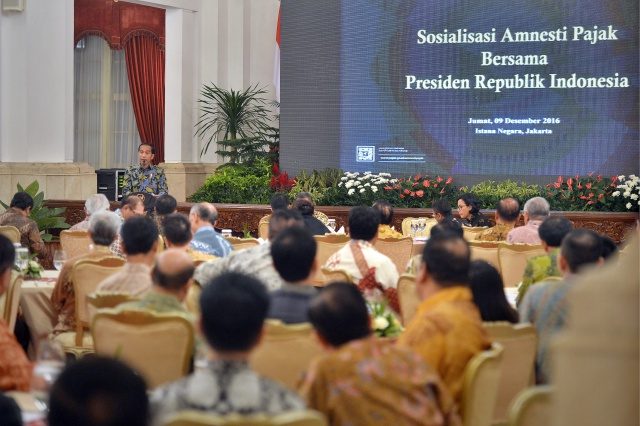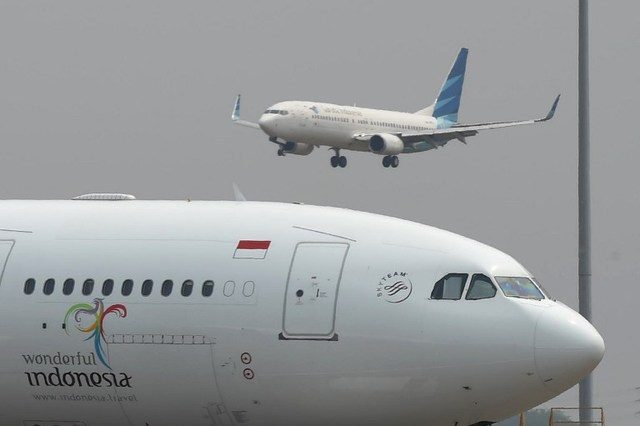SUMMARY
This is AI generated summarization, which may have errors. For context, always refer to the full article.

JAKARTA, Indonesia – On Monday, December 19, Merriam-Webster’s dictionary named “surreal” its Word of the Year 2016, the honor given to the word or term with the sharpest spike in look-ups over the previous year.
The word “surreal,” defined as “marked by the intense irrational reality of a dream,” was a word many searched due to extraordinary events that happened in 2016.
As the year comes to an end, Rappler Indonesia looks back at the year that was, and the top 5 positively surreal moments experienced by the world’s 4th most populous country.
Here are the best things that happened in Indonesia in 2016:
1. Death of Santoso

In July, Indonesia’s most wanted terrorist was killed after a gunfight between the militant group Mujahidin Indonesia Timur (MIT or East Indonesia Mujahideen) and a police task force – dealing a huge blow on Indonesia’s terrorism.
Santoso, alias Abu Wardah, who leads MIT, died on July 18. MIT has pledged allegiance to ISIS and has claimed responsibility for past terror attacks.
Santoso’s death is considered a success for the country’s counterterrorism efforts as police and military have tried for many years to find him.
The threat posed by ISIS in Southeast Asia is comparatively small, but real, and it has the potential to become larger if not addressed properly. It is clear that ISIS reinvigorated existing terror networks in the region. (READ: ISIS’ global ambitions and plans for Southeast Asia)
In the region, the center is Indonesia, the world’s 3rd largest democracy with more than 250 million people, the lynchpin of Southeast Asia. It also has the world’s largest Muslim population and has suffered the deadliest terrorist attacks in the region since the Bali bombings in 2002.
2. First Indonesian F1 driver

23-year-old Rio Haryanto in March became Indonesia’s first Formula One driver, when he competed at the season-opening Australian Grand Prix, on the back of just 4 days testing in his new Manor car.
He made his grand prix debut after signing a one-year deal in February with Manor Racing, previously known as Marussia.
“There’s been a tremendous response back home. Obviously to be able to compete in Formula One is a great thing and I’m very proud and I’m sure the whole nation is proud to have me in F1,” Haryanto said at his first official F1 media conference.
Manor said Haryanto impressed during his F1 trials and the 2015 GP2 series, where he finished 4th overall and topped the podium on 3 occasions. But Haryanto and his team had previously been locked in lengthy negotiations with Manor for months as they struggled to drum up the financial support needed to secure an F1 berth.
His campaign got across the line when funding was secured from the Indonesian government and the country’s state-owned oil company, as well as his major sponsor, Pertamina.
While Manor eventually announced in August that it was dropping Haryanto and replacing him with Frenchman Esteban Ocon, his historic F1 appearance inspired many.
Haryanto was forced to depart his one-year contract with Manor early, after his sponsors failed to bankroll the rest of his season.
3. Olympic badminton gold

Indonesian badminton stars Tontowi Ahmad and Liliyana Natsir won Indonesia’s only gold medal in the 2016 Rio Games, in the mixed doubles category, which they called a “gift” to their country on its independence day Wednesday, August 17.
The pair comfortably defeated Chan Peng Soon and Goh Liu Ying of Malaysia 2-0 to top the podium and claim the first badminton gold medal of the 2016 Olympics.
Ahmad and Natsir took the first game 21-14 before completing the victory with a 21-12 triumph in the second, delighting a noisy contingent of Indonesian fans who chanted their country’s name throughout.
“The supporters were amazing. Today is also Indonesia’s independence day so this is our gift to Indonesia,” a joyous Ahmad told reporters shortly after winning.
It was a first Olympic gold medal for both Ahmad and 30-year-old Natsir, who adds to her mixed doubles silver won at the 2008 Beijing Games.
Badminton has been Indonesia’s richest source of medals at the Olympics, ahead of weightlifting, but the archipelago failed to win a gold 4 years ago in London. Their triumph in Rio made up for that failure.
4. Tax amnesty roll out

Indonesia’s parliament in June passed a tax amnesty bill in a bid to give Southeast Asia’s top economy a multi-billion-dollar boost, defying criticism the move will let evaders off the hook.
The government believed the amnesty can bring in 165 trillion rupiah ($12.4 billion) of additional revenue this year by offering low rates to those who come forward to declare untaxed wealth.
Wealthy Indonesians have long chosen to stash billions of dollars abroad, particularly in neighbouring city-state Singapore, to keep it out of reach of the taxman.
Additionally, in July, Indonesian president Joko “Jokowi” Widodo appointed World Bank managing director Sri Mulyani Indrawati as the new finance minister, in his administration’s newest cabinet reshuffle to help with the tax amnesty.
In October, Indonesia hailed the tax amnesty as a major success after it raised more than $7 billion in its first few months.
The first phase of the amnesty – when people pay penalties as low as 2% on declared assets – closed end of September with better-than-expected results after a late surge in interest.
More than 350,000 people declared assets totalling 3,620 trillion rupiah ($278 billion), which brought the government 97.2 trillion rupiah ($7.46 billion) in revenue, according to finance ministry data.
Jokowi hailed the “trust from the people and the business community towards the government” while analysts welcomed the positive start to the amnesty, which runs until March 2017. However, criticism is mounting that the controversial scheme lets the super-rich off the hook.
5. Approved to fly to Europe, USA

In August, Indonesian airlines were cleared to fly to the United States after regulators there scrapped a nearly decade-long ban imposed for safety reasons.
US transport officials said in a letter Indonesia’s aviation sector had met international standards and its safety rating had accordingly been upgraded.
“Today all Indonesian airlines can fly to the United States,” director general of civil aviation, Suprasetyo, told reporters.
“This will have a very positive impact on our aviation sector and public trust.”
Indonesian carriers were banned from flying to the US in 2007 after the Federal Aviation Administration downgraded their safety rating.
The European Union also imposed restrictions the same year although these have since been lifted. – with reports from Santi Dewi/Natashya Gutierrez/Agence France-Presse/Rappler.com
Add a comment
How does this make you feel?
There are no comments yet. Add your comment to start the conversation.